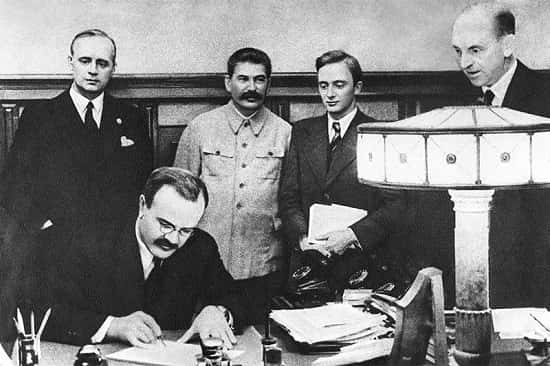
Fight Racism! Fight Imperialism! No. 89, September 1989
In recent weeks the bourgeois press and various Trotskyite rags have joined forces in a resounding chorus of anti-sovietism and deceit. It all concerns the 50th anniversary of the German-Soviet pact of 23 August 1939, and the plight of those ‘oppressed’ nationalities in Latvia, Estonia and Lithuania. In the Independent, a certain LSE professor, Donald Cameron Watt even suggests that the Soviet Union’s act of ‘treachery’ impelled the world to war (see the Independent 21 August 1989). DALE EVANS clarifies the issues.
British and French foreign policy in the 1930s centred on appeasing the Fascist powers. The policy emanated from sections of the ruling class which recognised the ‘right’ of German demands within central Europe, and rejected the constraints that the Versailles Treaty imposed on Germany. Therefore, the Nazis were able to remilitarise the Rhineland, annex Austria and the Sudetenland (German-speaking area of Czechoslovakia); and perhaps most importantly, were allowed a free hand in support of the fascist forces in Spain. This section of the British ruling class also supported the German claim to recover the free city of Danzig (now Gdansk) and annex it to East Prussia, thus denying Poland access to the sea.
By March 1939 war was imminent when the Czechoslovakian state fell apart and Hitler imposed control over the whole country. Also in March the Nazis seized Memel, a port in the German-speaking area of Lithuania. Appeasement, rather than satisfying German ‘national rights’ had only encouraged German imperialist expansion in Eastern Europe.
Such expansionism threatened the Soviet Union, which sought diplomatic and military alliances with Britain and France. In March 1939 contacts between the Soviet Union and Britain on the issue of collective security began. On 21 March the British government proposed a four-power declaration (Britain, France, Poland and the Soviet Union) that consultations would take place if any country came under threat. Poland rejected this, and proposed to the British a bilateral Polish-British agreement. Chamberlain, the British Prime Minister announced the famous guarantee to Poland in the House of Commons on 31 March. It was a worthless alliance which did not add one iota to European security, weakened the position of the Soviet Union and appeased the parochial Poles. Hitler was not impressed and merely tore up existing treaties between Germany and Poland and Britain. In the middle of April 1939 the Soviet Union proposed a mutual assistance pact which included France. The rejection of the so-called Litvinov (the Soviet foreign minister) plan led to his resignation and replacement by Molotov.
Later attempts at a British-French-Soviet pact came to nothing and outwardly stalled on the right of access for Soviet troops to fight on foreign soil, in particular Poland. In reality the negotiations were of a low diplomatic status, and were a ploy by Chamberlain to satisfy British public opinion after much criticism of the government’s failure to conclude a treaty with the Soviet Union.
The leadership of the Soviet Union faced a major strategic problem. If the Soviet Union became embroiled in a war with Germany, it faced the task of defending itself on a front stretching from the Baltic states to Rumania in the Balkans. In June 1939 both Latvia and Estonia, which were governed by anti-Soviet dictatorships, signed friendship treaties with the Nazis. The lack of a significant response from the British government forced the leadership of the Soviet Union to respond to diplomatic contacts from Germany. The future of socialism depended on its success in keeping the Soviet Union out of any European conflagration.
Nazi-Soviet contacts began in late May, Ribbentrop, the Nazi foreign minister, arrived in Moscow in August, and a pact was signed on 23 August. A further secret protocol eventually led to the annexation of Eastern Poland, the Baltic States and parts of Rumania by the Soviet Union. This, in the circumstances, was fully justified. Firstly, Eastern Poland contained Byelorossia, and the western Ukraine, areas seized by Poland after the defeat of the Red Army in 1921. The greater land area was an obvious military gain. The Baltic states threatened to be a launching pad for invading the Soviet Union, and in particular threatened the revolutionary city of Leningrad. Secondly German diplomatic interests in the region were wiped out at a stroke. However it is most important to remember that the Baltic states were not fully incorporated into the Soviet Union until June 1940 with the collapse of France and the fear and anxiety this created in the Soviet Union. With Germany having invaded Denmark and Norway, threatening to invade Sweden, and with Finland already very hostile, the Baltic states and Scandinavia threatened to become an area of complete German control.
The Soviet Union also feared the possibility of war on two fronts. Japan had already conquered most of Manchuria and the Japanese imperialists were friendly with the Nazis. The German-Soviet Pact secured the Soviet Union against this menace – in August 1939 a major clash between the Red Army and Japanese forces had taken place at Khalkin Gal, on the Soviet-Manchurian border. The German-Soviet pact has today become a cause celebre for the reactionary nationalists of Lithuania, Latvia and Estonia. They are quick to proclaim the ‘illegality’ of the secret protocol, and use it as the main plank in arguing their right to secede from the Soviet Union. Their failure to defend the Soviet Union’s right to take an extraordinary course in 1939 indicates the anti-socialist nature of their cause. It must be remembered that the nationalists of the Baltic states joined the Nazis in their thousands in the summer of 1941. 25,000 Estonians were killed fighting for fascism.




